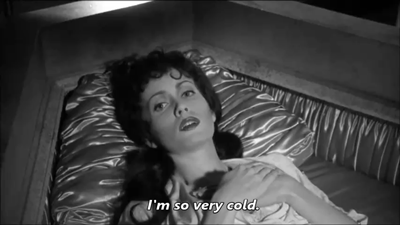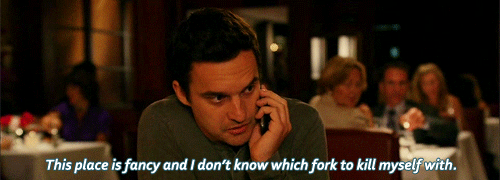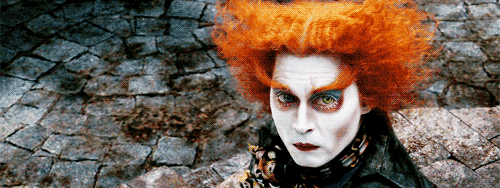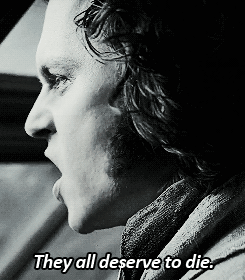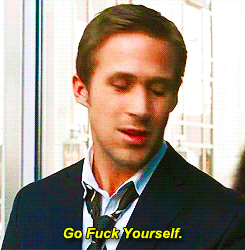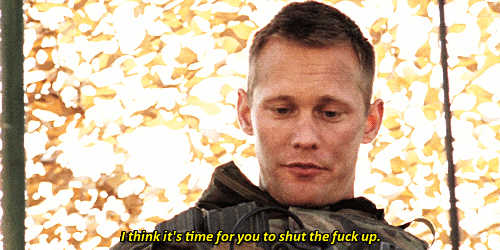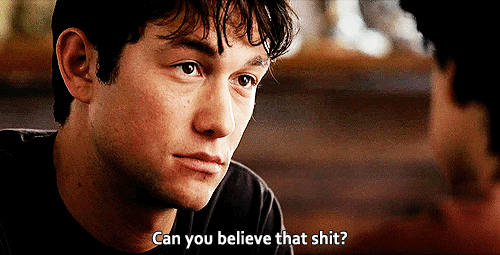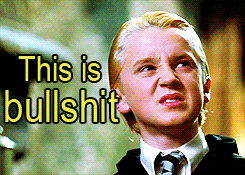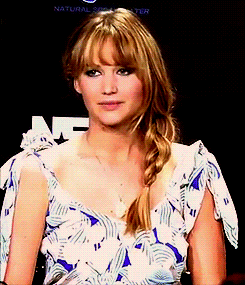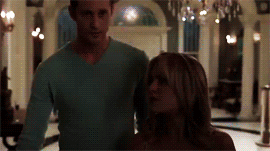Greetings, from chilly, chilly England!
Things seem to have taken a turn for the winter here of late, which makes sense since it's basically the end of November, but still. I will not have it. In a weirdly insulting turn of events, Tumblr just told me my browser was outdated when I went to find the above gif, and wow. That's not cool, Tumblr.
Anyway, stuff. It's Sunday! I... haven't really done anything this week. SHOCKER, I know, but there you go. I have to have some standards of consistency. Mostly I've been spending the week either complaining that I'm too hot or too cold, mostly because I've usually been too hot or too cold (I know). This is mainly down to the fact that I live and work in places that have insufficient central heating, so I have to rely on heaters that make me
too hot, but you can't turn them off because FREEZING and goddamn, I hate winter already.
So, instead of ranting on about how I'm always either too hot or too cold lately and it's making me GROUCHY, I'm going to talk about a thing like I used to do sometimes, and then you can tell me things you think about it, if you want. I know, it's a good plan, I like it too.
So here is the thing: How important do we think it is for a TV character to
be like you to be able to relate to them? What I mean is this: there's a lot of talk (and I am usually the one doing it) about the lack of anyone who isn't a straight white male on tv. I mean, obviously basically every TV show has women in it (the same can't be said for non-white, or non-heterosexual people, sadly) but they're usually in less important, background roles, like in say Breaking Bad, or The Sopranos. New Girl is
called New
Girl, but there are now 4 main dude characters and two women. I mean, it's a fairly dire situation, when you look at it statistically.
If we put that aside just for a second (not because it's unimportant, but because I want to work with the characters we
do have for a minute), I'm wondering: is it that important for a character to be like you in terms of your gender/race/sexuality for you to be able to relate to them? What I'm really saying is, I am basically Nick Miller, and I don't feel weird saying that because I'm not a white dude.
It would be kind of embarrassing for me to list all the ways in which I am Nick Miller, but will it be enough to say that I am Nick and he is me? No? Well, ok then- we're both underemployed, super poor,
really grumpy, maybe a tiny bit lazy and, you know, we both fancy Zooey Deschanel. Whilst I
am Nick Miller, I also
love Nick Miller, which makes things slightly complicated in my head because apparently I love myself? But the point is, I relate to him more than any other character on New Girl, which makes his successes my successes, and his failures my failures. At least, you know, a bit, and it doesn't feel weird that I relate less to Jess who, presumably should be my role model and whatnot (to be fair, she is a much better role model than Nick Miller. Just sayin.)
And then, another character I relate to but also
would marry is Luke from Gilmore Girls. And Gilmore Girls is a programme with
plenty of female characters to consider myself most like, and yet it is the grumpy but kindly dude from the diner that I consider myself to be most like, even though I feel like I would get a lot more annoyed with Lorelei than he does because OMG you talk too much, woman. Maybe that's a thing- that I like grumpy characters who don't always have to talk, but always have a presence when they're onscreen (obviously, cause that's the way narratives work...) and
that is the kind of thing that women characters are not encouraged to be.
So, in other words, maybe I have to relate to the dude characters cause the women aren't ever written in that way, which is a big lie on behalf of all TV cause hello! Here I am being all quiet and moody over here! Not, you know, perky and nice and generally go getting and excellent.
So, to bring this back to the start... does it matter that I relate to dude characters more than the girl ones sometimes? No. Not when the female characters are hardly ever written in a way I relate to, but maybe that's because I'm an unconventional girl. But does it matter that there isn't a vivid array of different female characters in every TV show (well, maybe not
every TV show), as well as people of colour and gay people? It does. It really really does. There are only a handful of shows I can think of that even come close to balancing the male:female ratio, and even ones that do don't always show a wide array of different characteristics within their women characters- because guys, 'femaleness' is not a trait, and seriously, we come in just as many different character types and styles as dudes do. REFLECT THIS, PLEASE.
Actual lady character I do relate to.
Parks and Recreation (which I will endeavour to write a post about this week) is as close to being perfect in a male-female way as I could hope, AND it's basically one of the best comedy series I've ever watched. IT CAN BE DONE, and it can be done well. For reals.
So tell me- do you think this is an issue or am I just making a fuss out of nothing? (I'm not). And which TV characters do you relate to that are so like you, but also so not like you? It can't be weirder than Nick Miller, is all I'm saying.
